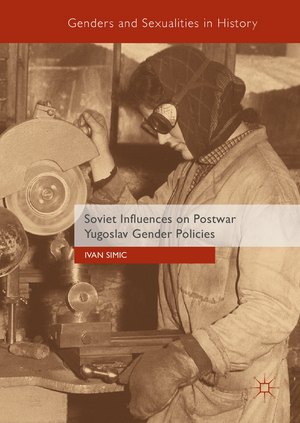Soviet Influences on Postwar Yugoslav Gender Policies: Genders and Sexualities in History
Autor Ivan Simicen Limba Engleză Hardback – 13 aug 2018
| Toate formatele și edițiile | Preț | Express |
|---|---|---|
| Paperback (1) | 384.86 lei 6-8 săpt. | |
| Springer International Publishing – 3 ian 2019 | 384.86 lei 6-8 săpt. | |
| Hardback (1) | 501.89 lei 6-8 săpt. | |
| Springer International Publishing – 13 aug 2018 | 501.89 lei 6-8 săpt. |
Din seria Genders and Sexualities in History
-
 Preț: 282.38 lei
Preț: 282.38 lei - 9%
 Preț: 695.10 lei
Preț: 695.10 lei - 18%
 Preț: 629.18 lei
Preț: 629.18 lei - 18%
 Preț: 782.57 lei
Preț: 782.57 lei - 20%
 Preț: 693.39 lei
Preț: 693.39 lei -
 Preț: 390.63 lei
Preț: 390.63 lei -
 Preț: 389.70 lei
Preț: 389.70 lei -
 Preț: 394.51 lei
Preț: 394.51 lei - 15%
 Preț: 589.33 lei
Preț: 589.33 lei - 15%
 Preț: 641.71 lei
Preț: 641.71 lei -
 Preț: 389.11 lei
Preț: 389.11 lei - 15%
 Preț: 646.62 lei
Preț: 646.62 lei - 15%
 Preț: 645.47 lei
Preț: 645.47 lei -
 Preț: 389.70 lei
Preț: 389.70 lei -
 Preț: 385.84 lei
Preț: 385.84 lei - 18%
 Preț: 791.09 lei
Preț: 791.09 lei - 15%
 Preț: 701.90 lei
Preț: 701.90 lei -
 Preț: 391.61 lei
Preț: 391.61 lei - 15%
 Preț: 697.32 lei
Preț: 697.32 lei - 15%
 Preț: 643.34 lei
Preț: 643.34 lei -
 Preț: 388.72 lei
Preț: 388.72 lei -
 Preț: 238.73 lei
Preț: 238.73 lei -
 Preț: 390.63 lei
Preț: 390.63 lei - 15%
 Preț: 644.95 lei
Preț: 644.95 lei - 15%
 Preț: 698.15 lei
Preț: 698.15 lei -
 Preț: 391.61 lei
Preț: 391.61 lei -
 Preț: 418.07 lei
Preț: 418.07 lei - 15%
 Preț: 585.26 lei
Preț: 585.26 lei -
 Preț: 395.47 lei
Preț: 395.47 lei -
 Preț: 387.38 lei
Preț: 387.38 lei - 15%
 Preț: 646.62 lei
Preț: 646.62 lei - 18%
 Preț: 826.41 lei
Preț: 826.41 lei - 15%
 Preț: 697.15 lei
Preț: 697.15 lei -
 Preț: 416.16 lei
Preț: 416.16 lei - 15%
 Preț: 643.34 lei
Preț: 643.34 lei -
 Preț: 390.63 lei
Preț: 390.63 lei - 18%
 Preț: 835.73 lei
Preț: 835.73 lei
Preț: 501.89 lei
Preț vechi: 590.46 lei
-15% Nou
Puncte Express: 753
Preț estimativ în valută:
96.04€ • 102.70$ • 80.07£
96.04€ • 102.70$ • 80.07£
Carte tipărită la comandă
Livrare economică 17 aprilie-01 mai
Preluare comenzi: 021 569.72.76
Specificații
ISBN-13: 9783319943817
ISBN-10: 3319943812
Pagini: 171
Ilustrații: XII, 271 p.
Dimensiuni: 148 x 210 mm
Greutate: 0.49 kg
Ediția:1st ed. 2018
Editura: Springer International Publishing
Colecția Palgrave Macmillan
Seria Genders and Sexualities in History
Locul publicării:Cham, Switzerland
ISBN-10: 3319943812
Pagini: 171
Ilustrații: XII, 271 p.
Dimensiuni: 148 x 210 mm
Greutate: 0.49 kg
Ediția:1st ed. 2018
Editura: Springer International Publishing
Colecția Palgrave Macmillan
Seria Genders and Sexualities in History
Locul publicării:Cham, Switzerland
Cuprins
Chapter 1: Introduction.- Chapter 2: The Transfer of Soviet Models.- Chapter 3: Framing Gender Policies.- Chapter 4: ‘Equal but…’ – The Impact of Gender on Labour Policies.- Chapter 5: The Impact of Collectivisation on Yugoslav Gender Relations.- Chapter 6: The Veil Lifting Campaign.- Chapter 7: Gender Policies towards Youth: From Stalinism to the Yugoslav Dilemma.- Chapter 8: Conclusions.- Bibliography.-Index.
Notă biografică
Ivan Simic is a postdoctoral fellow at Carleton University, Canada. He has taught at UCL and Goldsmiths, University of London and held research fellowships at Yale University and the University of Graz. Previous publications include a contribution to Gender in Twentieth-Century Eastern Europe and the Soviet Union (Palgrave, 2016) as well numerous articles on Yugoslav gender history.
Textul de pe ultima copertă
This book explores Soviet influences on Yugoslav gender policies, examining how Yugoslav communists interpreted, adapted and used Soviet ideas to change Yugoslav society. The book sheds new light on the role of Soviet models in producing Yugoslav family and reproductive laws, and in framing the understandings of gender which affected key policies such as the collectivisation of agriculture, labour policies, policies towards Muslim populations, and policies concerning youth sexuality. Through a gender analysis of all these policies, this book points to the difficulties of applying Soviet solutions in Yugoslavia. Deeply entrenched patriarchal attitudes undermined Yugoslav communists’ ability to challenge gender norms, causing many disputes and struggles within the Communist Party over the meanings and application of Soviet gender models. Yet, Soviet models informed how Yugoslav communists approached gender-related issues for many years, even after the conflict erupted between these two countries.
Caracteristici
Examines the influence of Soviet policies on gender relations and gender policy in Yugoslavia from 1945-1955 Considers the impact on key policies areas including agriculture, labour, immigration, as well as sexual and family relations Contributes to scholarship on gender history, cultural history and Yugoslav history
